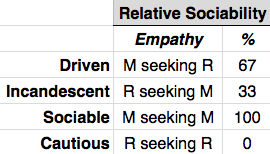
You get into the same jams again and again – the snags that never seem to snag anyone else – because you respond in the same way to the same situations over and over again.Photo by: tacit requiem (joanneQEscober )
Very few people are fluent in this notation system, so far, and Cathleen is by far the best of the bunch. That’s only fair: I’ve been making her talk to me in DISC-my-way for ten years now. She’s been there for every new idea, and she contributed a lot along the way – especially, as here, with beneficial resistance.
So: First: What you are is what you are. You chose your value priorities before you could choose reliably in fully-conscious self-awareness. You woke up as a human being already practiced in the habits of mind that have driven your choices ever since – and chances are all of this is news to you.
Your will is free, but your DISC predispositions are formidable, and they will express themselves from long-standing habit in every real-life circumstance where you do not explicitly, consciously override them.
You get into the same jams again and again – the snags that never seem to snag anyone else – because you respond in the same way to the same situations over and over again.
If you insist that I cannot possibly know what I’m talking about – typically a Ci chaos-rejection display – I can poke you with rhetorical sticks over and over again, until your rejection amplifies into outrage. Why would you be outraged if I’m wrong? Ahem.
As we’ve discussed, the Cautious and Incandescent temperaments can be mission-critically invaluable at work, but they are devastating to human social relationships.
Why are nerds so often celibate? Why is it lonely at the top? Too much aggression in the social strategy, too little reciprocity in the value pursuit – both of which imply too much reptilian empathy.
I can quantify all of this – in LegoNumbers™ – in relative values ascribed by scale to understand how priority-preferences express themselves in different DISC profiles.
Translation: I can rank-order human social prowess – who is likely to do well in relationships, who poorly – by DISC profile.
So first let’s distribute Sociability by DISC types:

We’re working from raw empathy strategies, whether the empathy is reptilian – deploying aggression in pursuit of unilateral values – or mammalian – expressing affection in pursuit of mutually-reciprocal values – or a hybrid of the two.
What you’re seeing here is the quality of character people call ‘consideration’ or ‘thoughtfulness.’ The Sociable care a lot about those social lubricants, the Cautious much less.
Working with those numbers and using the same kind of scaling strategy we used to chart full DISC profiles, we get to relative sociability by two-letter DISC type, the notation system we use to describe people, businesses, groups, governments or civilizations.

And it’s easy, from there, to sort the numbers into a rank-ordering of predictable ongoing amiability.

Your DISC profile – the behavior you express repeatedly, incessantly, habitually, unthinkingly – is why you get along as well or as poorly as you do with the people around you. Outlier events are all anyone ever wants to talk about, but the reality of your everyday life is here for you to see, in discernibly logical order.
Affection breeds affection. Aggression seeds agression. You’ve known that all along. Now it’s just harder to deny.
But consider this: Instead of rejecting reality, why not embrace it?
DISC-my-way is potent – as we are seeing, day upon day.
If you accept what you are for what you are, you can maximize your current potential while optimizing your future potential.
Translation: You can change and grow with a fully-informed plan of action.
And if you accept the people you love for what they are, you will learn to love them more deeply, even as you work together to make everyone better, making your relationship that much deeper and stronger day by day.
As a culture, we have enriched, enshrined and sanctified the DISC strategies that are most alienated from Sociability – especially Ci and Ic – while under-cutting, under-mining and eviscerating every aspect – every evidence! – of a normal human emotional life. We idealize people who hate love and people who love to hate – and then we look in horror at the hateful world we live in.
This is a correctable nuisance.
How?
Ds.
Ci is a terrible cultural strategy if the objective of civilization is human thriving – where Ds is ideal. But all high(er)-C and high(er)-I social strategies are at risk of too little thoughtful consideration and too much unilateral competition. D channels reptilian aggression toward S affection, and those two together make the most and the best love – and breed the most and the best offspring.
No one is all-the-way broken, and no one is all-the-way healed, but the more aggression you display or express to your loved ones, the more you will damage those relationships. And the more you enshrine aggression in the world at large, the uglier that world will be.
Am I being unfair to the Cautious and the Incandescent? I don’t think it’s cruel to tell a man his tire is about to blow. And I think it might even be a kindness to offer to help swap in the spare.
If you are broken, you can be healed. DISC – where you are now, and where you hope to be later – is how you will get the job done.















